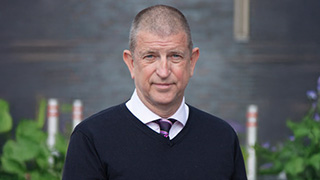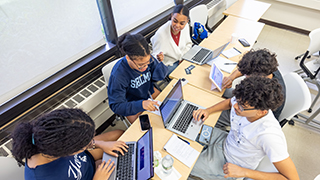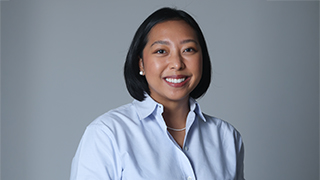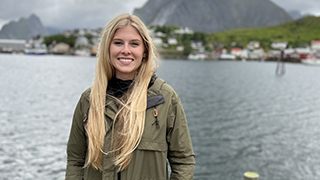A Meeting Of Young Minds: A Paradigm Shift
Tuesday, June 15, 2021
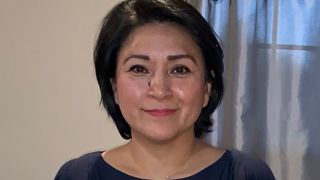
Kelly M Gutierrez
Four Seton Hall students (from both the Elementary and the Secondary Education Programs in CEHS) joined in a panel discussion with middle and high school scholars, teachers, and administrators from the East Orange Public School District. All sophomore Secondary Education students attended the event, as did scholars and teachers from East Orange. Shea Richardson, Supervisor for Social Studies for the East Orange Public School District, organized the event. Along with Dr. Daly from Educational Studies, she arranged for the format and topics to be addressed. Shea, a Seton Hall CEHS alumna, worked to plan a panel that included East Orange School District administrators and practitioners. She also invited and selected scholars from the middle and high school grades to participate.
Panel members from Educational Studies included: Brian Reilly, Secondary Education Mathematics major; Kelly M Gutierrez, Elementary Education Special Education major; Jacklyn H Morgentaler, Secondary Education History major; and Oliver DeLeon, Secondary Education English major. They engaged in a wide-ranging conversation focused on the concept of Culturally Relevant Pedagogy. All the panel members (as well as the Secondary Education sophomores attending the event) had previously read James Baldwin's work "A Talk to Teachers" (Delivered October 16, 1963, as "The Negro Child – His Self-Image"; initially published in The Saturday Review, December 21, 1963, reprinted in The Price of the Ticket, Collected Non-Fiction 1948-1985, Saint Martins 1985.). The conversation addressed what has changed since Baldwin's work, what has not changed, and what needs to change.
Before the event, the Seton Hall students and East Orange scholars had a Meet and
Greet on Monday, April 19. The meeting was to allow them to introduce themselves informally. The conversation
during the panel session on April 21 addressed issues critical in today’s educational arena.
Questions during the event were explicitly directed towards and responded to by pre-service
candidates from Seton Hall, East Orange Scholars, and some questions were open to
all members. Despite the virtual format, the participation and contributions of the
varied group were lively and engaging.
Some of the questions addressed include:
- How much of an effort do you make to incorporate non-slavery-based black history into your lessons? Is the effort made year-round or only during Black History Month?
- What are your thoughts about the following quote? What do you think Baldwin meant? How does this connect/disconnect with your own experiences in school? "One of the paradoxes of education was that precisely at the point when you begin to develop a conscience, you must find yourself at war with your society. It is your responsibility to change society if you think of yourself as an educated person."
- Baldwin argues that "any citizen of this country who figures himself as responsible — and particularly those of you who deal with the minds and hearts of young people — must be prepared to 'go for broke'…you must understand that in the attempt to correct so many generations of bad faith and cruelty, when it is operating not only in the classroom but in society, you will meet the most fantastic, the most brutal, and the most determined resistance." How might you consider social justice and antiracist curriculum in the current political climate?
- With everything that's going on and social media displaying more innocent people of color being hurt at the hands of law enforcement, how do you plan to introduce these topics into the classroom, and how can you help your students understand these recent incidents of racial violence?
- How does the work in your discipline or current/future classroom connect with Baldwin's vision? How are you engaging (or how might you engage) daily practice towards these ends?
The East Orange scholars were asked to address the following:
- Based on Baldwin's article combined with your personal, educational journey, what changes would you like to see in education? How do you propose that scholars/students can contribute to the development of culturally responsive learning or curriculum? What are some of the best culturally responsive teaching strategies that you would like to share with our future educators today?
The success of the event has led to planning for one or more conversations next year.
Categories: Education, Nation and World



